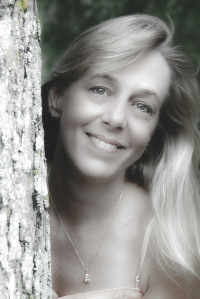
Jorja sent me a friend request last year, and after looking at her page, I accepted. She’s a brilliant storyteller who is always supportive of other writers. She’s mystical and magical in an unseen universe (see what I did there?), and chaotically creative. I’m privileged to have a connection with Jorja and wished to share her stories—about her life and in her fiction. She’s a lovely human.
Tell me about your writing process, including environment, inspirations, schedule, strategies, and muse (if you have one!).
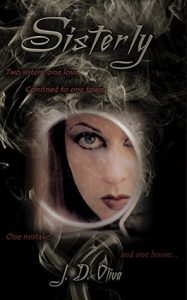 Is there ever a process for anything when you have kids? I try to steal time to write, but I do it every day. I journal, I write ideas when they pop up, and I write poetry. I am an emotional storyteller, because in all honesty, I struggle with my emotions, so in turn I heal. I don’t write from a desk or have an office. I write from my laptop, which is portable, so I can take it places, but mostly I write from my couch. I have been known to write in my car while my son is at football practice, I would say a third of Sisterly was written or edited there. It is for me, really, no different than reading a good book, an escape, but I get to choose the ending. As for a muse, this is the concept that I thought only I experienced. When I write I do feel as though I am channeling many muses. I like to think of them as my writing angels. My grandmother (my mother’s mother) was, in her lifetime, the best storyteller. When I was a child, she would tell us a story that I would visualize so vividly. I would like to think that she is still telling me those stories I loved to listen to as a child. Our stories are very important to generations to come. They learn from our mistakes and gain knowledge to what works. Life is not easy.
Is there ever a process for anything when you have kids? I try to steal time to write, but I do it every day. I journal, I write ideas when they pop up, and I write poetry. I am an emotional storyteller, because in all honesty, I struggle with my emotions, so in turn I heal. I don’t write from a desk or have an office. I write from my laptop, which is portable, so I can take it places, but mostly I write from my couch. I have been known to write in my car while my son is at football practice, I would say a third of Sisterly was written or edited there. It is for me, really, no different than reading a good book, an escape, but I get to choose the ending. As for a muse, this is the concept that I thought only I experienced. When I write I do feel as though I am channeling many muses. I like to think of them as my writing angels. My grandmother (my mother’s mother) was, in her lifetime, the best storyteller. When I was a child, she would tell us a story that I would visualize so vividly. I would like to think that she is still telling me those stories I loved to listen to as a child. Our stories are very important to generations to come. They learn from our mistakes and gain knowledge to what works. Life is not easy.
I love the story of how you started writing—elaborate upon that and how the relationship with your mother encouraged you in this direction.
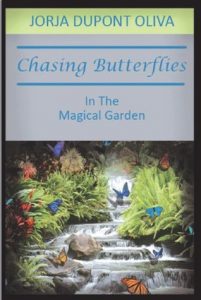 My mother wrote for our local paper. She loved to write and would always talk about wanting to write a book. She could come up with stories that conveyed a message about love, friendships, and all the good things life has to offer (Hallmark channel was her favorite). Sadly, I lost my mother this year, February 2018. She unfortunately never published any of her works. She lived that dream through me I suppose. Let me step back and explain,–I talked my Mother into taking a class to teach you how to write a book. At that time I had no interest in writing a book. I just thought it was something we could do to spend time together and possibly help her achieve one of her dreams. I found a love for writing—it was my purpose, and looking back, I was always a writer. My Mother wrote many short stories through our adventure in this class, but my Mother always put her kids first. She became my biggest fan. By the end of the class I had created a book—Chasing Butterflies in the Magical Garden (2013). By the way, I plan to publish her work in the coming year. I see it like this—I have gained another writing angel during her time on earth and in her after life.
My mother wrote for our local paper. She loved to write and would always talk about wanting to write a book. She could come up with stories that conveyed a message about love, friendships, and all the good things life has to offer (Hallmark channel was her favorite). Sadly, I lost my mother this year, February 2018. She unfortunately never published any of her works. She lived that dream through me I suppose. Let me step back and explain,–I talked my Mother into taking a class to teach you how to write a book. At that time I had no interest in writing a book. I just thought it was something we could do to spend time together and possibly help her achieve one of her dreams. I found a love for writing—it was my purpose, and looking back, I was always a writer. My Mother wrote many short stories through our adventure in this class, but my Mother always put her kids first. She became my biggest fan. By the end of the class I had created a book—Chasing Butterflies in the Magical Garden (2013). By the way, I plan to publish her work in the coming year. I see it like this—I have gained another writing angel during her time on earth and in her after life.
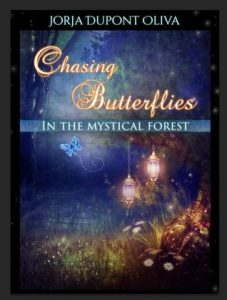 What finds its way into your stories and why?
What finds its way into your stories and why?
I try to teach lessons or convey wisdom we learn through our lifetime by using every day stories. I love to entertain while doing this, which may be possibly why I add a little magic to my stories (I think I get that from my grandmother). I love to read stories that make you question or wonder, or have a spiritual aspect. I also love surprises. Metaphors are always welcome in my writing as well, and I like to hide them throughout my stories. So why not write what I enjoy reading?
Describe your support system—your team, everyone who works with you or gives you props.
Gosh, I have a lot of support, sometimes so much support, I will never be able to retire from writing. My family supports me with my writing the most. When my mother passed, I have to say, my emotions held me back from taking her writing. They were the first to tell me that they were mine. I got the whole box! There is something very connecting reading someone’s writing. It is the truest form of them. I am truly blessed. I also have a wonderful writing community. We meet once a week to discuss our writing endeavors. We do not critique. We only motivate and challenge our own abilities. That is the best kind of writing community to have. I’ll tell you why—each of us is different, we learn in many ways, and we have different interests. Readers are the same, are they not? Don’t get me wrong; we do at times read each other’s work and give suggestions, which in turn gets our own creative juices flowing. Last is a good editor, but not for ty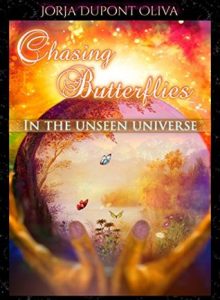 pos, because let’s face it, typos happen! During final edit we worry about those. I have been fortunate to have two wonderful and patient editors. I spend most of my time on editing and rewriting. I am not going to tell you it is my weakness. I am just going to say I don’t edit while I write. Editing interferes with my creative process. When most people think of an editor, they think of someone who comes in and cleans it all up. I’m sure there are some editors out there that do that, but that isn’t my case. I have two supportive editing coaches. They show me things I missed or need to elaborate on and we work together to prefect it. It is usually a 4 to 6 time go-over on the story. While this is happening, I send my story with a WARNING to everyday people to read and send me feedback. Usually I have at least 4 to 5 people of different ages and opinions. I have even sent one of my first drafts to my 4th grade English teacher, who is now retired. I can’t express the importance of having many people working with you to produce the best you are capable of producing.
pos, because let’s face it, typos happen! During final edit we worry about those. I have been fortunate to have two wonderful and patient editors. I spend most of my time on editing and rewriting. I am not going to tell you it is my weakness. I am just going to say I don’t edit while I write. Editing interferes with my creative process. When most people think of an editor, they think of someone who comes in and cleans it all up. I’m sure there are some editors out there that do that, but that isn’t my case. I have two supportive editing coaches. They show me things I missed or need to elaborate on and we work together to prefect it. It is usually a 4 to 6 time go-over on the story. While this is happening, I send my story with a WARNING to everyday people to read and send me feedback. Usually I have at least 4 to 5 people of different ages and opinions. I have even sent one of my first drafts to my 4th grade English teacher, who is now retired. I can’t express the importance of having many people working with you to produce the best you are capable of producing.
What do you love most about your creativity?
I love creating! I love everything about the process of creating. I’ll admit, with my first book, I wasn’t fond of rewriting and editing, because it was work. Now after 4 books, 2 anthologies, many short stories, and a screenplay, I enjoy the rewriting and editing process as much as I do creating the story. The only thing I do struggle with is the ending to a creative project, the moment it is published. I’m like a lost puppy looking for a new story to write.
Follow Jorja on social media and buy her books here:
Facebook Chasing Butterflies in the Magical Garden page
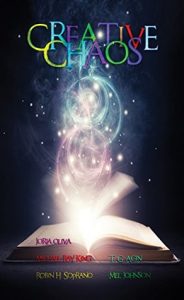 Facebook Chasing Butterflies in the Mystical Forest page
Facebook Chasing Butterflies in the Mystical Forest page
Facebook Chasing Butterflies in the Unseen Universe page
A Night Like This: A Flagler County Anthology benefiting Christmas Come True
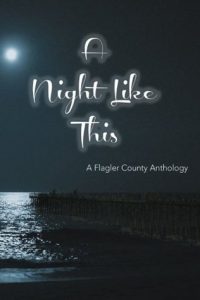
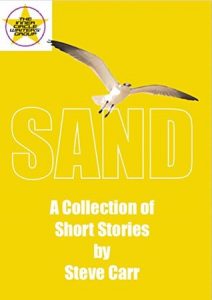 Steve Carr’s first collection of short stories is fantastic. His work is intense, reaching into the reader’s head and twisting emotions, shattering logic and reason. The first story Tenderloin is—pun intended—a punch in the gut, as the reader sees the grittiness of the setting and feels the coiled tension in the main character, a veteran of the Iraq War. With journalistic expertise, Carr displays monstrous humanity in a brevity of words, as in The Saguaro Two Step, in which the woman wins the loot in the end, and exposes desperation, as in The Festival of The Cull, wherein Shamina can no longer vote on who is to be terminated. Reality bends as one ventures further into the book, as in the self-explanatory The Girl in a Mason Jar, gets fishy in Strange Water, and disappears in When Wizards Sing, where animals and men blend. The stories are diverse, with main characters of various genders, sexual orientations, ages, cultures, and even species. The book ends with stories of the afterlife on a never-ending train ride for incorrigibles, a man’s struggle for gravity, and the misplaced hope of a senior citizen. Definitely a must-read! Follow Steve on
Steve Carr’s first collection of short stories is fantastic. His work is intense, reaching into the reader’s head and twisting emotions, shattering logic and reason. The first story Tenderloin is—pun intended—a punch in the gut, as the reader sees the grittiness of the setting and feels the coiled tension in the main character, a veteran of the Iraq War. With journalistic expertise, Carr displays monstrous humanity in a brevity of words, as in The Saguaro Two Step, in which the woman wins the loot in the end, and exposes desperation, as in The Festival of The Cull, wherein Shamina can no longer vote on who is to be terminated. Reality bends as one ventures further into the book, as in the self-explanatory The Girl in a Mason Jar, gets fishy in Strange Water, and disappears in When Wizards Sing, where animals and men blend. The stories are diverse, with main characters of various genders, sexual orientations, ages, cultures, and even species. The book ends with stories of the afterlife on a never-ending train ride for incorrigibles, a man’s struggle for gravity, and the misplaced hope of a senior citizen. Definitely a must-read! Follow Steve on